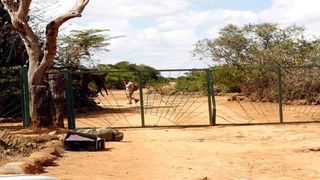
The main entrance to Laikipia Nature Conservancy in Laikipia West where two GSU officers were killed during an operation to flash out bandits.
| File | Nation Media GroupNews
Premium
How four security personnel met their deaths in Laikipia ambush
What you need to know:
- Despite heavy presence of security personnel, bandit attacks have continued in the insecurity-hit parts of Laikipia West.
- Top security chiefs in the country are said to be considering a fresh gun mop-up in the insecurity-prone areas.
On Wednesday morning, an unknown number of armed bandits attempted to raid the Kamwenje General Service Unit (GSU) command centre on the border of Laikipia and Baringo counties.
Officers from the elite paramilitary unit who were already stationed in the area in an ongoing operation repulsed the attackers and managed to go back to their camp.
Later on, a team of officers was dispatched to pursue the attackers who had returned to their hiding place inside the Laikipia Nature Conservancy.
Two General Service Unit (GSU) junior officers who were part of the team were ambushed at the conservancy and killed in a fierce gunfight. A GSU inspector also sustained serious gunshot wounds to the leg during the ambush.
Another team of GSU officers was dispatched to the conservancy, but realised that the bandits were in their hundreds and chances of being overpowered were high, so they retreated to their camp.
An officer attached to the camp told the Nation that his two colleagues had succumbed to gunshot wounds.
The National Police Service, having been informed of the attack that took the lives of the two officers, sent a helicopter to the region and launched an aerial strike.
"The bandits went to their hideouts in the conservancy after the incident," said the officer.
Security personnel shot dead
The bandits, who were being pursued, launched another attack on a team of Kenya Defence Forces (KDF) soldiers who were excavating a trench along the conservancy road from Wangwachi to Kamwenje, killing two of them on the spot at Ng’elecha.
The trench will serve as a barrier for animals moving from the conservancy in search of water and pasture into nearby farms and destroying crops.
The soldiers were trying to cover another trench that is suspected to have been dug by the bandits to prevent security forces and their vehicles from accessing Ng’elecha, which is said to be the bandits’ turf.
This brings to four the number of security personnel shot dead on Wednesday, and to 10 those who have been killed since the operation was launched.
Rift Valley Regional Police Commander Frederick Ochieng confirmed that there had been a confrontation involving the security personnel and suspected bandits, but did not confirm the number of casualties.
This is the second time armed bandits are raiding the GSU command centre and in the neighborhood of the 100,000-acre Laikipia Nature Conservancy.
It comes barely two weeks after three officers were attacked and killed by bandits at the vast conservancy. Two others sustained gunshot wounds.
Fresh gun mop-up
Three weeks ago, the government deployed dozens of security forces to the volatile conservancy to flush out bandits and illegal herders following an order by Interior Cabinet Secretary Fred Matiang'i to flush them out.
A month ago, the government deployed at least 400 police officers to flush out the attackers. Armoured personnel carriers were also dispatched to hotspots in the region, and two military choppers have been conducting regular aerial surveillance.
However, despite heavy presence of the Anti-Stock Theft Unit, the Rapid Deployment Unit and GSU, the bandit attacks continue in the insecurity-hit parts of Laikipia West.
The conservancy management has told the Nation that bandits and armed herders are still roaming freely at the ranch and have been arriving at the conservancy in their thousands since the operation was launched.
An employee at the conservancy who sought anonymity alleged that the government has been pushing for grazing deals between the herders and the conservancy’s management.
Yesterday, Rift Valley Regional Commissioner George Natembeya said the government had intensified its security operation in the area, even as it plans to conduct a disarmament to contain rising cattle rustling and banditry attacks in Laikipia and Samburu counties.
The Nation has established that top security chiefs in the country are considering a fresh gun mop-up in the insecurity-prone areas, amid increasing attacks that have claimed dozens of lives.
Mr Natembeya said security agencies would resume an intensive disarmament in the insecurity-prone areas to seize illegal guns and arrest criminals wreaking havoc in the regions.
Hideout for bandits
The administrator admitted that the expansive Laikipia Nature Conservancy still remains a headache to security officers, reiterating his earlier statement that the bandits had sophisticated weapons.
The 365-square-kilometre wildlife sanctuary owned by renowned conservationist Kuki Gallmann has been the theatre of killings and is a hideout for criminals launching attacks on security forces.
The state resorted to disarmament in January, after more than 10 people were killed in a span of one week in Kapedo, Turkana East. Among those killed were senior security officers deployed in the area.
They were Superintendent of Police Emadau Tebakol, Chief Inspector Moses Lekariab and a driver, Police Constable Benson Kaburu, who were shot by armed criminals suspected to be from the neighbouring Tiaty.
The gun mop-up was ordered in the insecurity-prone Ameyan, Paka, Silale, Nadome, Komolion, Kapau, Toplen, Chesitet, Nakoko, Riong'o, Akwichatis, Nasorot, Lomelo, Lokori and Kapedo. Close to 80 guns were seized in the security operation in Baringo, Turkana, Laikipia and Samburu counties.
However, no criminals were arrested during the disarmament, just as there were none arrested the previous years.
Security analyst Kiyo Ng'ang'a said the solution to ending the menace of illegal guns in the country that include military grade rifles such as the M16, is sealing the porous borders through which they are smuggled in.
“Disarmaments will not help end this menace, the government must endeavour to stop smuggling of the illegal firearms from other countries,” said Mr Ng’ang’a.






